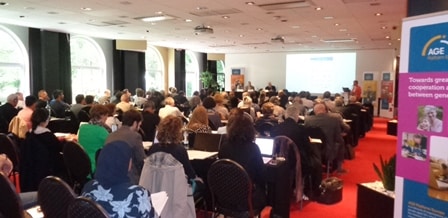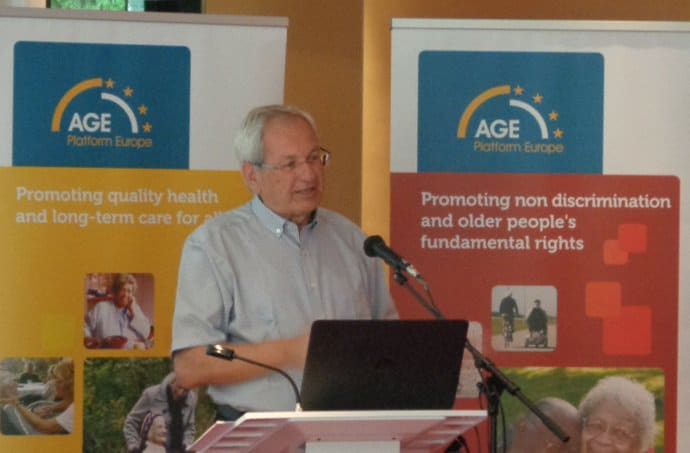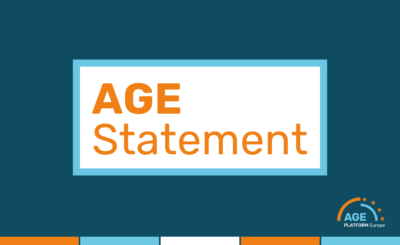
AGE Annual Conference: “Inequalities and abuse in old age: Time to Act!”
AGE 5th Annual Conference seized the momentum of European Commission’s Year of action on violence against women and the World Elder Abuse Awareness. It explored how human rights in old age can be materialised using the existing policies and legal framework, and considered the added value that a new United Nations (UN) treaty on the rights of older persons would bring. The event brought together around 100 representatives of older people’s organisations, legal experts, European institutions, academia and civil society active in human rights. Participants took stock of the existing gaps in the protection of older persons. Findings from this exchange provided recommendations for AGE policy work that was used to feed AGE contribution to the 8th meeting of the Open-Ended Working Group on ageing (OEWG), in New York 5-7 July 2017.

On behalf of the European Commission, Ana Carla Pereira (DG Employment) and Johan ten Geuzendam (DG Justice) presented the most recent work of the EU around the rights of older people, in particular the proposal for a European Pillar of Social Rights including the work-life balance initiative.

On the issue of differential treatment, Bridget Sleap insisted that these should be based on individual criteria, not on age ground. Some participants highlighted the need for the EU to advance in banning discrimination on all grounds in access to goods and services and agreed that treating people differently based on their age needs to be explicitly and specifically justified and not been driven by ageist generalizations.
Summarizing the discussions, rapporteurs Dee Masters, from Cloisters, and Laura Christ, from the Older Women’s Network Europe and member of AGE Taskforce on human rights and non-discrimination, emphasized the lack of meaningful implementation of non-discrimination legislation and the need for instruments to ensure effective implementation. They also pointed out the gaps that exist in addressing the ‘soft’/’shadow’ discrimination experienced by older people and in accessing the information, in particular in rural areas.

The rapporteurs Nevena Peneva, from the Fundamental Rights Agency, and Dr. Heidrun Mollenkopf, AGE vice-president and member of AGE Taskforce on human rights and non-discrimination, concluded by reflecting on the normative elements brought forward by the speakers and participants, as well as on daily experiences and social realities of older persons.
The conference ended with a training session on the use of the Convention of the Rights of Persons with Disabilities (CRPD) by older persons. Ana Peláez Vice-President of the European Disability Forum, Paula Pinto member of the Academic Network of Experts in Disability (ANED) and Michiel Doeveren from the Dutch National Bank highlighted the relevance of the CRPD for older persons with disabilities and functional limitations and the real impact of such instrument. Ana Peláez explained how the disability movement campaigned to get the UNCRPD adopted and how older people with disabilitiescan use it to advocate for their rights, how they can work with organisations of persons with disabilities at national and EU level. Presenting the work of ANED on disability and older people, Paula Pinto referred to the EU disability database DOTCOM, collecting information about national laws, policies, strategies and initiatives. Michiel van Doeveren explained the challenges linked to the digitalization of financial and payment services and the risk for exclusion of some population groups, including older persons and they are doing in the Euro Retail Payment Board working group on Accessibility led by AGE. He presented the campaign Pay-Able supporting financial inclusion and encouraged older people’s organisations to disseminate and support this campaign at national level.
AGE General Assembly elects new President and adopts new internal strategy and agrees on next four years’ priorities

The General Assembly also adopted AGE’s new 4-year strategic plan 2018-2021 which was developed over the past year with the active involvement of AGE members and task force experts. The document defines the vision, mission, objectives, priorities and activities of AGE Platform Europe for the upcoming years.
The 2017 General Assembly closed with the adoption of the Final Declaration, calling upon Member States, the European Parliament and the European Commission to rebuild a collective European project aimed at giving the EU a true identity thanks to its capacity for integration and based on its core values: human dignity, freedom, democracy, equality, the rule of law, and respect for human rights. Recalling the respect and enjoyment of one’s human rights by all individuals as a fundamental feature of our democratic societies, AGE members urged Member States, the European Parliament and the European Commission to proclaim the rights proposed by the EU Social Pillar during the next Social Summit on 17 November 2017.
AGE members engaged in thematic networking sessions
On 9th June, following request by some members, AGE members had the opportunity to take part in four thematic networking sessions on topics suggested by members: old-age loneliness and social isolation; old-age incontinence and dignity; financial elder abuse; and experiences of user involvement in research projects. Conceived to allow members to exchange and learn on their respective work, initiatives or advocacy methods, the networking sessions aimed also to support their future engagement and work at national and local level.
More information
- Agenda of AGE Annual Conference
- AGE Strategy 2018-2021
- AGE General Assembly Final Declaration: EN – FR
- Links to the presentations of the conference:
-
‘Aging, Ageism, and Ageivism: A New Perspective on the Human Rights of Older Persons’, by Dr. Israel Doron, Head of the Department of Gerontology at University of Haifa.
Watch here the videos from Doron’s presentation. -
‘Older people in the work of the Academic Network of European Disability’, by Paula Pinto, ANED Research Team and University of Lisbon
-
‘Improving access to financial services and payment methods for older persons and people with disabilities – A Dutch case study’, by Michiel van Doeveren, Senior policy advisor, De Nederlandsche Bank N.V.
-






